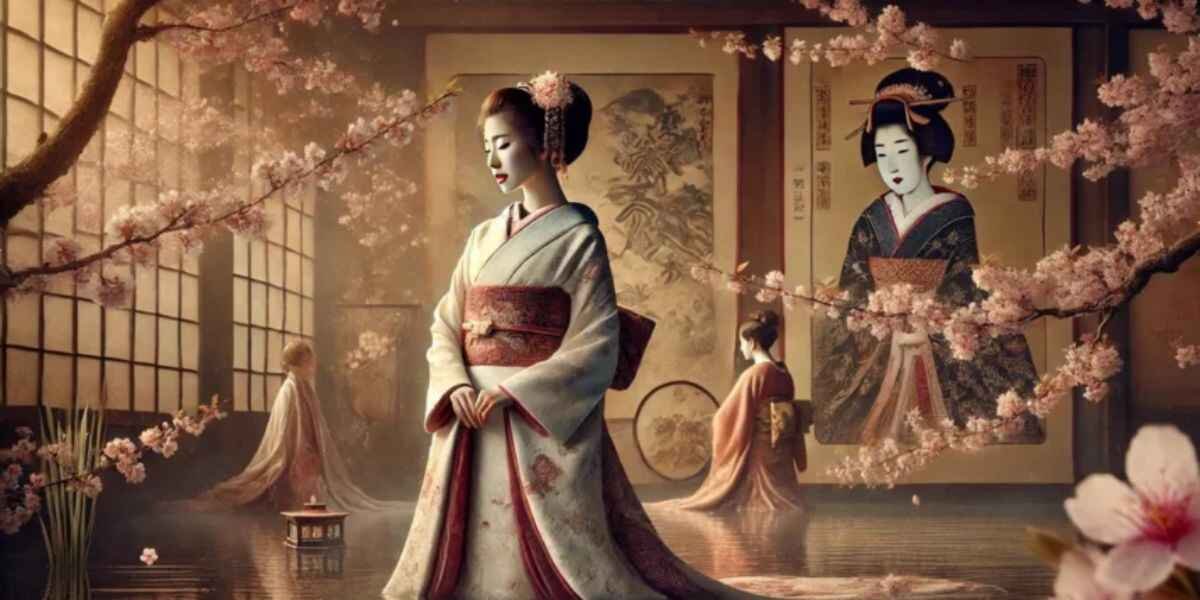Minami Ukifune is a fascinating character in Japanese literature from The Tale of Genji (Genji Monogatari). It is considered to be the world’s first novels. This traditional work was written by Murasaki Shikibu in the 11th century during the Heian period. Minami Ukifune plays a central role in the Uji chapters and often referred to as the third part of the novel. Her character is complex and her story reflects the emotional and psychological depth that makes The Tale of Genji such an influential work in world literature.
Minami Ukifune, whose name means “drifting boat” symbolizes the uncertainty and emotional values of many female characters experience in the novel. She is often caught between conflicting lovers and her fate. She leads to an internal struggle that reflects her drifting nature both physically and metaphorically.
Historical Context of Minami Ukifune
Minami Ukifune character stands through the Uji chapters of The Tale of Genji. It marks a shift in the tone of the novel. These chapters were written at a time when Japan was ruled by a court system. The court placed an immense pressure on individuals, especially women, to confirm the societal expectations. The Heian period was characterized by a court culture that idealized romance and freedom of restricted women. Minami Ukifune symbolizes the struggle of many women faced in reconciling their personal desires with the strict social rules that governed their lives.
The Cultural Significance of Minami Ukifune
Minami Ukifune has an important place in Japanese literature. It represents the emotional depth and psychological complexity that characterized the best of Heian era storytelling. Her role in The Tale of Genji shows important cultural themes such as loyalty, the fleeting nature of love and the constant pull between duty and personal emotion. Through Ukifune readers can understand how women navigated a world where their worth was often tied to their relationships with men.
Role of Minami Ukifune in The Tale of Genji
Minami Ukifune enters the story during the Uji chapters. She is presented as a character surrounded by a tragic love triangle. She is romantically pursued by both Prince Niou and Kaoru. These are two most famous and important characters in the story. This love triangle becomes a key element in illustrating the emotional and societal constraints of the Heian period particularly for women.
Caught Between Two Lovers
Minami Ukifune story basically revolves around Prince Niou, who is charming and passionate and Kaoru, who is reserved and mysterious. Both men deeply care for her but Ukifune struggles with her emotions to ensure which path to take. Her role highlights the theme of insubstantiality and emotional conflict which is continued throughout in The Tale of Genji.
Her Name’s Symbolism
The name “Minami Ukifune” perfectly reflects her character life. She is a drifting boat who is uncertain and caught in the currents of other desires. This sense of drifting applies not only to her emotional state but also to her physical journey. She is often moved from place to place and never fully in control of her own destiny.
The Attempted Suicide
One of the most pivotal moments in Minami Ukifune story is her attempted suicide. She is overwhelmed by the love triangle, societal expectations and her internal struggles, which drive her to the edge. She throws herself into the Uji River hoping to end her emotional suffering. However she is rescued and subsequently takes on a life of seclusion in a nunnery. It is a common path for women in her position during the Heian era.
The Theme of Emotional Turmoil in Minami Ukifune Story
Minami Ukifune narrative is a profound exploration of the emotional and psychological pressures faced by women during the Heian period. She is constantly caught between societal expectations and personal desires which make her one of the more tragic figures in The Tale of Genji. Her struggles speak to broader themes of the time. It includes the limited agency of women on their own lives and the oppressive nature of courtly romance.
Societal Expectations
As a woman in the Heian period Minami Ukifune is expected to adhere certain societal norms, particularly regarding marriage and relationships. The courtly culture places immense pressure on women to navigate complicated love affairs to maintain their honor and dignity. For Ukifune, the love triangle between Niou and Kaoru becomes overpowering. It leads her to mental breakdown and eventual withdrawal from society.
Personal Desires vs. Duty
Minami Ukifune indecision reflects the tension between personal desire and societal duty. On one hand she feels a strong emotional connection to both Niou and Kaoru. But on the other hand she is constrained by societal norms that dictate how she should behave. This tension reflects her decision to attempt suicide because she feels that there is no other way to escape the impossible situation she finds herself in.
Minami Ukifune Psychological Transformation
Minami Ukifune undergoes a significant psychological transformation throughout her story. After her failed suicide attempt she finds a form of solace in religious devotion. This shift from being caught in worldly desires to seek peace. Spiritual means reflects the themes of renunciation and enlightenment present in The Tale of Genji.
From Passion to Seclusion
Initially, Minami Ukifune is consumed by her passionate love affairs. She decides to enter a religious community which represents a complete rejection of the material world. This transition is not just a physical one but a psychological and emotional release from the controls that have overwhelmed her life.
Spiritual Enlightenment
Minami Ukifune turn to religion and can be seen as a path toward spiritual education. In the Heian period, it was common for women who had experienced great emotional trauma to seek refuge in Buddhism. Ukifune story reflects this cultural tradition as she abandons her worldly attachments in favor of a life of spiritual reflection.
Influence of Minami Ukifune in Literature
Minami Ukifune character had a lasting influence on Japanese literature and culture. Her story is the most emotional and tragic in The Tale of Genji and it continues to resound with readers today. The themes of love, loss and emotional conflict her character. It has influenced numerous works of literature and art both in Japan and around the world.
Representing Struggles of Women
Minami Ukifune struggles represent the broader challenges faced by women in historical Japan. In Japan societal expectations often conflicted with personal desires. Her story continues to be studied as an example of the emotional depth and complexity that women characters could embody in classical literature.
A Timeless Character
Though written over a thousand years ago but Minami Ukifune emotional turmoil and search for peace are themes that remain relevant today. Modern readers can empathize with her struggles by making her a timeless figure in world of literature.
The Impact of Minami Ukifune in Modern Interpretations
In contemporary culture the character of Minami Ukifune continues to be interpreted in many forms from academic studies to artistic representations. Her narrative has been adapted into plays, movies and other artistic works. She shows how her story of emotional conflict and transformation still captures the human experience.
Adaptations in Media
Minami Ukifune character has been represented in various editions of The Tale of Genji. These adaptations often highlight her tragic love story by focusing on her emotional depth and psychological journey. From traditional Noh and Kabuki Theater to modern films her story continues to be retold in new and creative ways.
A Symbol of Emotional Resilience
In many modern interpretations Minami Ukifune is seen as a symbol of emotional resilience. Despite the trauma and heartbreak she endures and ultimately finds peace through spiritual means. This aspect of her story resonates with modern audiences who view her journey as one of the survival and self-discovery.
Minami Ukifune Symbolism
The name Minami Ukifune means “drifting boat” a metaphor that captures her emotional state and the uncertainty she faces throughout her life. Much like a boat adrift in a river she is carried along by the desires of others. She often feel helpless to direct her own course. This symbolism is further highlighted by her ultimate decision to withdraw from the world and enter a religious community. She finds peace away from the pressures of court life and romantic messes.
Artistic and Mythological Representations of Minami Ukifune
Minami Ukifune character has inspired various artistic interpretations, from traditional Japanese art to modern visual representations. Her story also contains mythological elements as her failed suicide and spiritual journey echo themes found in Japanese folklore. Ukifune is often depicted as a symbol of fragility and emotional endurance, qualities that resonate deeply within Japanese culture. Her role in art often portrays her as both tragic and transcendent spiritual existence.
Minami Ukifune in Literature
In Japanese literature Minami Ukifune serves as a powerful example of a character whose emotional depth influence writers and scholars. Her story in The Tale of Genji is one of the earliest examples of a female character described with such emotional difficulty. She made herself a milestone in the depiction of women in literature. Ukifune tragic love story has not only influenced the classical literature but also modern Japanese storytelling.
Minami Ukifune in Modern Interpretations
Minami Ukifune story continues to captivate modern audiences through various adaptations. It includes theater, film and literature. Her narrative is often revisited in modern interpretations of The Tale of Genji where her emotional struggles are explored in greater detail. Modern adaptations tend to emphasize her resilience. It transforms her from a sad figure to a symbol of survival and self-discovery. This new angle of her character speaks about the universal nature of her story which resounds with readers beyond the historical context of the Heian period.
Minami Ukifune in Popular Media
In recent years Minami Ukifune has appeared in various forms of popular media including Japanese anime, television dramas and movies that are inspired by The Tale of Genji. These adaptations often reimagine her character for modern audiences by adding new aspects to her emotional journey. Her character has even been explored in fan fiction. She writers about her backstory or envision alternate endings to her tragic fate. This continuing interest in Ukifune shows how her story remains relevant in today’s world.
Tourism and Sites of Interest Related to Minami Ukifune
For those who are interested in exploring the historical and cultural significance of Minami Ukifune. There are several places in Japan related with The Tale of Genji. The Uji area where Ukifune story takes place is a popular destination for literary tourists. Uji is home for many landmarks which are mentioned in the novel including the Uji River which plays an important role in Ukifune story. Visitors can also explore museums and temples dedicated to preserve the legacy of The Tale of Genji and its characters.
Educational Resources on Minami Ukifune
For those looking to study Minami Ukifune and her role in The Tale of Genji, there are numerous educational resources available. Many universities offer courses on classical Japanese literature that include Ukifune story as part of the curriculum. Additionally, there are scholarly articles and books dedicated to explore the themes, symbolism and historical context of her character. Online platforms also provide access to English translations of The Tale of Genji which allow readers around the world to learn more about this iconic character.
The Legacy of Minami Ukifune
The legacy of Minami Ukifune is the emotional depth, cultural significance and timeless appeal. Her story continues to be studied and admired for its complex picture of human emotions and the complex societal norms of her time. As a character Ukifune has showed her role in The Tale of Genji. She becomes a symbol of love, loss and the search for spiritual peace. Her legacy lives through literature, art and modern interpretations which make her one of the most enduring figures in Japanese cultural history.
Conclusion
Minami Ukifune is more than just a character in The Tale of Genji. She is a symbol of the emotional and societal struggles faced by women in historical Japan. Her story is filled with love, tragedy and ultimate spiritual education. She continues to be in mind of audiences today. Whether through literature, art or modern media, Ukifune legacy endures as a timeless example of human resilience and the question for inner peace.
FAQs about Minami Ukifune
Q1: Is Minami Ukifune deaf?
A1: No, She is not deaf. In The Tale of Genji she is portrayed as a tragic character. Her physical abilities including hearing are not depicted as impaired.
Q2: What country is Minami Ukifune from?
A2: Minami Ukifune is a character from The Tale of Genji, a famous Japanese literary classic. Therefore she is from Japan.
Q3: Is Minami Ukifune a good singer?
A3: There is no specific mention of Minami Ukifune being a singer in The Tale of Genji. Her character is primarily known for her emotional depth and tragic storyline rather than any musical abilities.
Q4: Who is the owner of Minami Toronto?
A4: The owner of Minami Toronto is Seigo Nakamura. He is the founder of Aburi Restaurants and is known for its sushi and Japanese cuisine.
Q5: What is the cultural significance of Minami Ukifune?
A5: Minami Ukifune represents the themes of love, emotional conflict and fate in The Tale of Genji. She is a symbol of helplessness and the struggles of women during the Heian period.
Q6: Why is Minami Ukifune considered a tragic character?
A6: Minami Ukifune is considered tragic because of the emotional turmoil she faces, especially being torn between two lovers. Her internal conflict leads to a mental breakdown which make her one of the saddest figures in Japanese literature.






